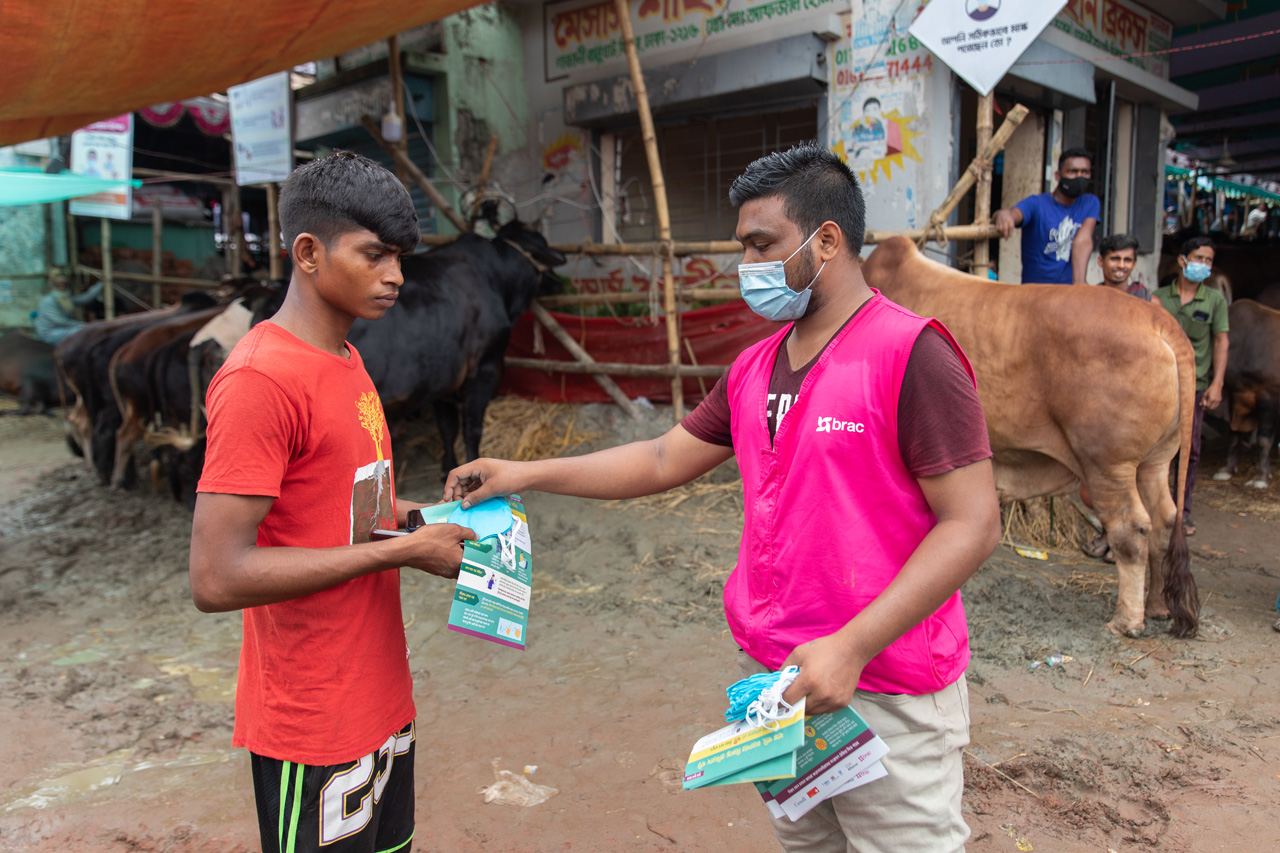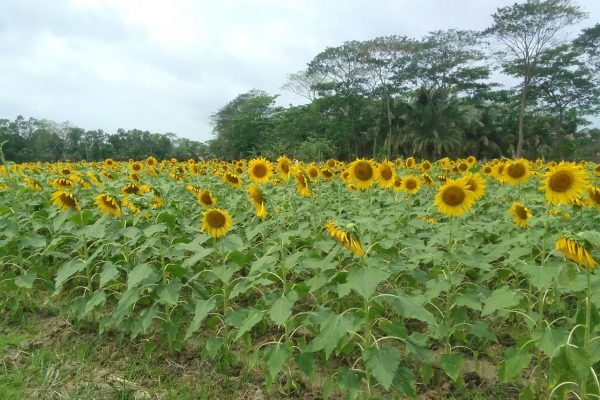No alternative to community resilience against COVID-19: In conversation with Suzanne Mueller, Head of Cooperation/Deputy Head of Mission, Embassy of Switzerland in Bangladesh
Reading Time: 5 minutes
The Community Fort for Resisting COVID-19 project is a protracted effort to contain the virus within communities in Bangladesh, by equipping 81 million people across 35 high-risk districts with the tools and knowledge to keep themselves and their families safe. The project is implemented by a coalition of organisations who work at the community level. BRAC sat down with one of the partners, the Embassy of Switzerland in Bangladesh:
The pandemic is far from over in Bangladesh – with more than 3,000 new cases being reported daily. The Embassy of Switzerland in Bangladesh has worked to support Bangladesh through the pandemic for the past year and a half, including through BRAC’s Community Fort for Resisting COVID-19 (‘CFRC’ hereafter).
The CFRC project launched on 1 June 2021, and is making steady progress in supporting communities to become more resilient in the face of COVID-19 through prevention, masking, response and vaccination. Read more in the latest situation report here.
Read more: COVID-19 in Bangladesh: Update from Asif Saleh (6 September 2021)
Suzanne Mueller, Head of Cooperation and Deputy Head of Mission at the Embassy of Switzerland in Bangladesh, discusses their approach in responding to the pandemic through their development cooperation portfolio, during this public health crisis:
Switzerland’s work in Bangladesh typically focuses on issues of democratic governance, economic development, labour migration and contributes to the international humanitarian response to the Rohingya refugee crisis. How did you modify the Embassy`s existing portfolio to respond to the COVID-19 pandemic in Bangladesh?
Even before the lockdowns began in March 2020, we had begun thinking about how to repurpose our efforts in Bangladesh to respond to the pandemic. Our first course of action was to get in touch with programme partners who were active in the field.
Next, we began repurposing resources for around CHF8 million. Our headquarters were helpful, allowing us to make quick adjustments to our existing programmes. While bureaucracies take a while to adapt to new situations, we were lucky to have the Swiss Federal Department of Foreign Affairs respond quickly to our needs.
We ended up making changes to several of our programmes and projects in order to respond to the pandemic. Most contracts required amendments. Swiss response focused on prevention through awareness creation, provision of personal protective equipment and hygiene materials, cash support, food assistance and capacity building of frontline respondents. Within the Embassy, staff safety was a priority so we took the necessary precautions and provided proper protective gear and hygiene materials to all staff.
One of our rapid response actions included collaborating with BRAC to provide cash assistance, training frontline workers and raising awareness throughout the Cox’s Bazar district. This support is a part of the broader partnership through the SDC BRAC Social Cohesion Fund for the Cox’s Bazar District.
Ultimately, the pandemic response is a continuous process, and we are adapting quickly to tackle the many curveballs that appear in the path to recovery and building social and economic resilience.

Photo Credit©BRAC
What drew the Embassy of Switzerland in Bangladesh to support the CFRC project with BRAC as part of its support during the pandemic?
The community approach here is key. Under the CFRC, people are not only being given free masks, but they are also being educated on safety precautions and behavioural changes. People are learning to be resilient in the face of a pandemic that is going on for an indefinite period. They are figuring out how they can protect both their lives and livelihoods.
I believe that in a country of 180 million people, there is no alternative to community resilience against COVID-19. Building this resilience takes a lot of work. Going from door to door, educating and sensitising people – we must keep building awareness until behaviours truly change. We believe given your wide outreach within various communities across the country, BRAC has the capacity to pull off such a mammoth task. That is why Switzerland really believes in the work this project is doing.
Read more: How do we build forts of resistance against COVID-19?
CFRC puts communities at the heart of its activities. Can community engagement bring about long-term behavioural changes among people? What possible improvements can BRAC bring to this approach in the medium to long run?
Distributing masks is one thing, and wearing them is another. The scale at which BRAC is operating is commendable – having distributed over 13 million free masks to people in 35 districts. But what I appreciate even more is the organisation’s determination to enforce mask-wearing behaviour in people.
Speaking from my experience in Bangladesh, bringing about behaviour change can be a struggle, but it is not impossible. People learn from their family, educational institutions, influential members of the community, religious leaders such as imams and teachers. BRAC engages with these influencers in its CFRC project, creating positive examples and role models within the communities. Behaviour change is possible, with the protracted efforts to bring positive changes by individuals who are trusted by people in the communities. That is precisely what CFRC is doing.
This is the only method that can work, but it is very intensive work, both in terms of labour and other resources. Field staff and volunteers are going to each household in the project areas, showing people how they can stay safe from COVID-19 through prevention, masking, response and vaccination. BRAC is empowering communities to take matters into their own hands. People are the real change makers, you just have to give them the right tools.
Read more: Building rural forts of resistance against COVID-19: What we are learning in Bangladesh
As an international development partner, why is it important to work with local non-governmental organisations (‘NGOs’ hereafter)?
Our cooperation with Bangladesh is almost 50 years long, and we have extensive experience working with local NGOs that have allowed us to come up with localised interventions that cater to particular communities and help us achieve specific development objectives.
What stands out about BRAC is its incredible outreach and widespread network across Bangladesh. We look for capacity and competence in the local organisations we work with, and BRAC has both these qualities. It is the largest NGO in the world, and one of the biggest players in the development sector in Bangladesh. The organisation emphasises knowledge and learning, and strengthens capacity of smaller, local NGOs. The CFRC project alone brings together 41 local sub-partners. From the production of masks to knowledge generation, the organisation’s work spans many sectors, and so this is a very valuable partnership for us.
As the Government begins mass vaccination drives, CFRC is helping people get registered for the shots. The project is also adapting its interventions to suit people’s needs — during Eid-ul-Azha, we set up free antigen-testing booths at nine cattle markets and distributed masks and hand sanitisers in a massive awareness-raising campaign. As a donor, do you think these are effective interventions?
It is so very important that every person has access to the vaccine, not just those with fast internet connections and smartphones. CFRC’s effort to help citizens get registered for the vaccine bridges this digital divide. Vaccination and COVID-19 compliant behaviour gives us the most protection and builds resilience in the long run.

Photo Credit©BRAC
As for the interventions during Eid-ul-Azha, it would have been impossible to simply cancel the celebration of such a huge religious festival. Many traders are dependent on the income from these cattle markets. Buyers also rely on them. In such situations, it is best to provide safety measures and contain the spread of COVID-19.
Once again, CFRC acknowledges the reality that it operates in and caters its interventions accordingly, and that is the correct approach in development.
Switzerland has been an active development partner in Bangladesh for nearly 50 years. Bilateral relations are mainly focused on development cooperation, economic development and trade. The Embassy of Switzerland in Bangladesh has been supporting numerous development initiatives across Bangladesh, with a strong focus on promoting inclusive and sustainable growth as well as leaving-no-one-behind.
This interview was conducted by MD Yazdani, Communications Specialist at BRAC Communications.





